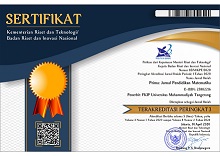MISCONCEPTIONS OF PROSPECTIVE MATHEMATICS TEACHER IN LINEAR EQUATIONS SYSTEM
Abstract
Keywords
Full Text:
PDFReferences
AL-Rababaha, Y., Yew, W. T., & Meng, C. C. (2020). Misconceptions in School Algebra. International Journal of Academic Research in Business and Social Sciences, 10(5), 803–812
Azis M., Tahmir S., & Minggi, I. (2020). Miskonsepsi pada Materi Aljabar Siswa Kelas VIII SMP. IMED: Issues in Mathematics Education, 4(2), 178-187. https://doi.org/10.35580/imed15329
Booth, J.L., McGinn, K.M., Barbieri, C., Young, L.K. (2017). Misconceptions and Learning Algebra. In: Stewart, S. (eds) And the Rest is Just Algebra. Springer, Cham. https://doi.org/10.1007/978-3-319-45053-7_4
Diana, D., Fitriani, N., & Amelia, R. (2021). Sistem Persamaan Linear Dua Variabel: ditinjau dari Analisis Kesalahan Siswa MTs Kelas VIII pada Pembalajaran Daring. JPMI – Jurnal Pembelajaran Matematika Inovatif, 4 (4), 985-992
Edogawatte, G. (2011). Secondary School Students’ Misconceptions In Algebra. A Thesis. Toronto : University of Toronto.
Heruman. (2007). Model Pembelajaran Matematika di Sekolah Dasar. Bandung: PT Remaja Rosdakarya.
Hasan, S., Bagayoko, D. & Kelley, E.L. (1999). Misconceptions And The Certainty Response Index (CRI). Physics Education 34(5):294-299. DOI: 10.1088/0031-9120/34/5/304
Kurniati, D. (2007). Analisis Kesalahan Peserta didik Kelas VII SMP Negeri 2 Puger dalam Menyelesaikan Soal-soal yang Berkaitan dengan Persegi Panjang dan Persegi. Tesis Pendidikan Matematika tidak diterbitkan. Surabaya: PPs Universitas Negeri Surabaya
Salirawati, D. (2011). Pengembangan Instrumen Pendeteksi Miskonsepsi Kimia pada Peserta Didik SMA. Disertasi. PPsUNY.
Tayubi, Y. R. (2005). Identifikasi Miskonsepsi Pada Konsep-konsep Fisika Menggunakan Certainty of Response Index (CRI). Mimbar Pendidikan. No. 3/XXIV.
Tim Pengembang Kurikulum Pendidikan Matematika Unesa. (2021). Dokumen Kurikulum Pendidikan Matematika Unesa. Surabaya: Jurusan Matematika Unesa.
Wafiyah, N. (2012). Identifikasi Miskonsepsi Siswa dan Faktor-faktor Penyebab pada Materi Permutasi dan Kombinasi di SMA Negeri 1 Manyar. Gamatika Vol. II No.2, 128-138
DOI: http://dx.doi.org/10.31000/prima.v7i1.7379
Article Metrics
Abstract - 2320 PDF - 1975Refbacks
- There are currently no refbacks.
Prima: Jurnal Pendidikan Matematika
Program Studi Pendidikan Matematika
Fakultas Keguruan dan Ilmu Pendidikan
Universitas Muhammadiyah Tangerang
Jl. Perintis Kemerdekaan I/33, Cikokol
Kota Tangerang, Indonesia
e-mail: primajpm@gmail.com
Prima: Jurnal Pendidikan Matematika (p-ISSN: 2579-9827 | e-ISSN: 2580-2216) is licensed under a Creative Commons Attribution 4.0 International License.







